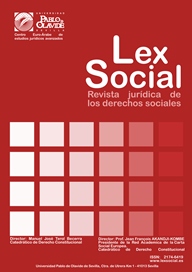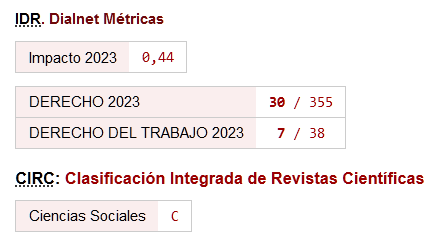The labour legal institution of collective dismissal
DOI:
https://doi.org/10.46661/lexsocial.7877Keywords:
collective dismissal, administrative authorization, labour authority, judicial control, causesAbstract
The purpose of this study is to discern whether the role currently held by the labour authority as a residual body that oversees the legality of the file of the collective dismissal procedure, after the disappearance of the administrative authorization, has contributed to reduce or enhance the control judicial, in terms of the verification of the causes, and their concretion, and therefore, the legal certainty and the speed of the procedure to follow, since the majority of the judicial resolutions dictated in this matter, have focused on the negotiation in the consultation period, avoiding in a certain way, the accreditation of the causes alleged by the employer in the termination decision, especially when there has been an agreement in the consultation period.
In this sense, one might wonder if certain deviations that have occurred after the disappearance of the administrative authorization have to be corrected, since the role that must be fulfilled in the consultation period, in my opinion, has been distorted, by granting it, a relevant role in the classification of collective dismissals, underestimating the concurrence of the cause and its consequences, and therefore, the exaltation of compliance with formal requirements, as the central axis of judicial control of collective dismissals, being the role of the labour authority in the collective dismissal procedure, merely instrumental.
Downloads
References
ALFONSO MELLADO, C. L. (2012), "Reforma laboral y ley reguladora de la jurisdicción social", Revista de Derecho Social, núm. 57, pp. 263-278.
ALFONSO MELLADO, C. L. (2013), "Las reformas laborales de 2012: una valoración inicial", en Carlos Luis Alfonso Mellado y Guillermo Emilio Rodríguez Pastor (dirs.), Reforma Laboral de 2012. Últimas reformas laborales y de seguridad social, Valencia, Tirant Lo Blanch, pp. 15-29.
ARIAS DOMÍNGUEZ, A. (2014), Tres años de reforma del despido colectivo ¿Ha conseguido su propósito el legislador?, Madrid, Dykinson.
BLASCO PELLICER, A. (2009), Los expedientes de regulación de empleo, Valencia, Tirant lo Blanch.
BLASCO PELLICER, A. (2020), "El despido colectivo", en Tomás Sala Franco (dir.), La extinción del contrato de trabajo, Valencia, Tirant Lo Blanch, pp. 223-261.
BODAS MARTÍN, R. (2017), "La documentación pertinente en los despidos por causas económicas, técnicas, organizativas y de producción", Lan Harremanak, núm. 35, pp. 113-149. https://doi.org/10.1387/lan-harremanak.17490
BODAS MARTÍN, R. (2018), "El rodaje en España de los despidos colectivos: aciertos y disfunciones", IusLabor, núm. 1, pp. 1-3.
DESDENTADO BONETE, A. (2016), "La delimitación legal del despido colectivo de hecho", en Martín Godino Reyes (dir.), Tratado de despido colectivo, Valencia, Tirant Lo Blanch, pp. 29-68.
FERNÁNDEZ FERNÁNDEZ, R. (2012), "La extinción del contrato de trabajo", en Javier Fernández-Costales Muñoz (dir), Guía práctica de la Reforma Laboral de 2012, León, Eolas, pp. 91-109.
GARCÍA PIÑEIRO, N. P. (2012), "Aspectos procesales de la reforma: Despido Colectivo y otras cuestiones", en Alfredo Montoya Melgar y Juan García Murcia (dirs.), Comentario a la reforma laboral de 2012, Cizur Menor (Navarra), Civitas Thomson Reuters, pp. 313-340.
IRIARTE, N. (2017), "Negociación colectiva y control sindical. Aspectos laborales y económicos", Lan Harremanak, núm. 35, pp. 335-356. https://doi.org/10.1387/lan-harremanak.17501
MARTÍN MORETA, M. E. (2013), "La autorización administrativa en el despido colectivo: La supresión de la autorización administrativa de los despidos colectivos" Aranzadi Social: Revista Doctrinal, Vol. 5, núm. 9, pp. 341-346.
MARTÍN VALVERDE, A.; GARCÍA MURCIA, J. (2012), El despido. Cuestiones prácticas que plantea la Reforma Laboral de 2012, Cizur Menor (Navarra), Civitas Thomson Reuters.
MIÑARRO YANINI, M. (2012), "La flexibilización del despido colectivo por la Ley 3/2012 y su incidencia en la formulación de las causas justificantes: voluntad liberalizadora versus límites jurídicos y función judicial", Relaciones Laborales, núms. 19-20, pp. 1-19. Consultado en formato electrónico.
MONEREO PÉREZ, J. L. (2014), "La intervención administrativa en los despidos colectivos", Temas Laborales, núm. 125, p. 219-267.
PÉREZ GUERRERO, Mª. L. (2014), "El papel de la Inspección de Trabajo y Seguridad Social en los procedimientos de despido colectivo", Temas Laborales, núm. 123, p. 209-219.
RÍOS MESTRE, J. Mª. (2012), Despido colectivo y concurso de acreedores, Cizur Menor (Navarra), Civitas Thomson Reuters.
RIVERA SÁNCHEZ, J. R. (2013), "El despido colectivo: causas, procedimiento y efectos", en Carlos Luis Alfonso Mellado y Guillermo Emilio Rodríguez Pastor (dirs.), Reforma Laboral de 2012. Últimas reformas laborales y de seguridad social, Valencia, Tirant Lo Blanch, pp. 211-228.
TOSCANI GIMÉNEZ, D. (2012), "Las reformas llevadas a cabo en el régimen jurídico del despido por la reforma laboral de 2012", Relaciones Laborales, núms. 19-20, pp. 1-30. Consultado en formato electrónico.
VARELA AUTRÁN, B. (2012), "El despido colectivo en la nueva reforma laboral", Diario La Ley, núm. 7866, pp. 1-4. Consultado en formato electrónico.
Downloads
Published
How to Cite
Issue
Section
License
Copyright (c) 2022 Maria Desamparados Bohigues Esparza

This work is licensed under a Creative Commons Attribution-NonCommercial-ShareAlike 4.0 International License.
-
Atribución — Usted debe dar crédito de manera adecuada, brindar un enlace a la licencia, e indicar si se han realizado cambios. Puede hacerlo en cualquier forma razonable, pero no de forma tal que sugiera que usted o su uso tienen el apoyo de la licenciante.
-
NoComercial — Usted no puede hacer uso del material con propósitos comerciales.
-
CompartirIgual — Si remezcla, transforma o crea a partir del material, deberá difundir sus contribuciones bajo la misma licencia que el original.



 @Lex Social
@Lex Social Linkedin
Linkedin @lexrevista.bsky.social
@lexrevista.bsky.social



